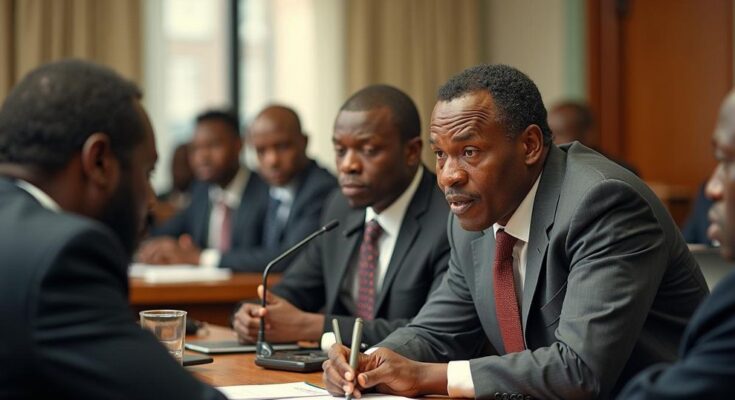South Sudan is preparing to create a Hybrid Court to prosecute war crimes committed since the onset of civil war in 2013. Recent legislative actions reflect significant steps toward transitional justice; however, political resistance poses challenges to successful implementation. Key political figures express concerns that the court may exacerbate existing tensions, prompting debates around alternative approaches to reconciliation.
South Sudan is poised to advance the establishment of a Hybrid Court aimed at prosecuting individuals accused of war crimes and crimes against humanity stemming from the civil conflict that commenced in December 2013. Recently, the Transitional National Legislative Assembly passed two pivotal legislative measures: the Commission for Truth, Reconciliation and Healing Bill 2024 and the Compensation and Reparation Authority Bill 2024. These legislative actions represent a substantial step toward achieving transitional justice within the nation. Despite strong backing from significant donor nations, including the United States, the United Kingdom, and Norway, the country’s leadership remains hesitant to fully embrace transitional justice initiatives, fearing such measures might revive historical grievances. The Hybrid Court, as envisaged in Chapter 5 of the Revitalised Agreement on the Resolution of the Conflict in the Republic of South Sudan (R-ARCSS) — a peace accord finalized in 2018 — is still met with skepticism among political figures, particularly regarding acknowledging the truth of past atrocities. Bona Deng Lawrence, the chairperson of the Standing Specialised Committee on Peace and Reconciliation, emphasized that the bills under consideration aim to address the conflicts’ legacies, provide justice to victims, and facilitate psychological support for both victims and perpetrators. The civil conflict, ignited by a power struggle between President Salva Kiir and his former deputy Riek Machar, has had devastating impacts, claiming over 400,000 lives and displacing millions both internally and externally. Notably, the Deputy Chair of the Information Committee, Natelina Amjima Malek, remarked that the new legislation seeks to provide reparations and restore properties lost during the violence. Nonetheless, doubts persist regarding the political will required to enact the Hybrid Court effectively. Civil rights advocate Edmund Yakani articulated significant concerns, stating that the leadership appears largely opposed to the court’s establishment. In an instance of resistance to accountability, Kiir and Machar previously stated that South Sudan requires “truth, not trials,” suggesting that the Hybrid Court could hinder national healing efforts. This perspective is echoed by Ezekiel Lol Gatkuoth, a former government official, who argued that accusations of war crimes are politically motivated. In light of these complexities, Akol Miyen Kuol, a political analyst, suggested that community-based reconciliation methods may be more suitable for addressing grievances related to the conflict than a formal court process, arguing that a Hybrid Court might escalate tensions rather than resolve them.
The initiative to create a Hybrid Court in South Sudan has emerged as a response to the extensive human rights violations committed during the ongoing civil war. Since its outbreak in December 2013, South Sudan has faced catastrophic violence resulting from a power conflict between political leaders, leading to widespread atrocities. The passing of the Commission for Truth, Reconciliation and Healing Bill and the Compensation and Reparation Authority Bill marks significant legislative progress aimed at the pursuit of justice and healing for both victims and the broader society. However, the prevailing political climate and leadership opposition raise questions about the successful implementation of a Hybrid Court, which is seen by many as essential for accountability and transitional justice. The government’s reluctance to embrace these reforms is complicated by fears of reigniting historical conflicts, calling into question the effectiveness of the Hybrid Court in South Sudan’s fragile context.
In summary, South Sudan’s move to establish a Hybrid Court is a crucial step towards addressing the severe injustices birthed by the ongoing civil war. While legislative efforts to facilitate transitional justice have garnered support, political reluctance and fears about societal repercussions pose significant hurdles. As the country navigates these challenges, there remains a pressing need for a balanced approach that considers the delicate socio-political landscape, with community reconciliation potentially serving as a viable alternative to formal judicial processes. Without robust political commitment, the effectiveness of such judicial mechanisms remains uncertain.
Original Source: www.theeastafrican.co.ke




